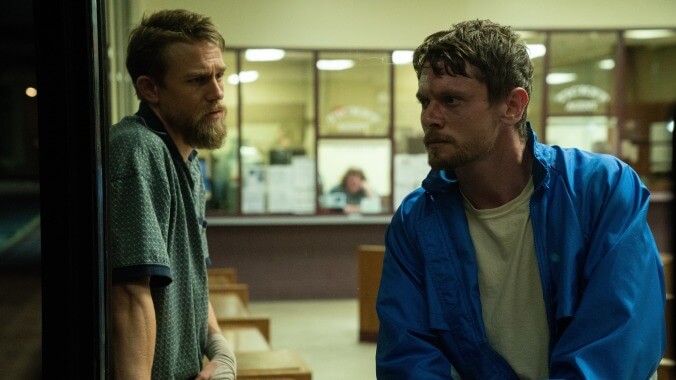Charlie Hunnam and Jack O’Connell bring macho tenderness to boxing drama Jungleland

Earnest fraternal affection is the main attraction in Jungleland, director Max Winkler’s moody road-trip movie by way of a bare-knuckle boxing drama. Though burdened by a derivative plot full of nefarious kingpins and unpaid debts, what sells this rugged story of men fighting their way out of their circumstances (and boneheaded choices) are magnetic English stars Charlie Hunnam and Jack O’Connell, playing blue collar brothers gearing up for a life-altering event. Then a negative result in an underground fight throws a wrench into their plans, forcing them to accept a clandestine assignment transporting precious cargo.
De facto manager and trainer Stan (Hunnam), the elder of the pair who overflows with unfounded bravado, dedicates his every fiber to raw talent Lion (O’Connell), fighting for a shot at success (i.e., a house in California). Dressed in silk shirts and fashionable sportswear, Stan walks on a cloud of blind ambition, unable to accept defeat even if it punches him square in the face. Hunnam’s remarkably charismatic turn as the troubled hustler is fueled by an unhealthy intensity full of nuanced contradictions: Arguably, Stan is using Lion for personal gain. But codependency is a more exact term for their dynamic; the way Stan looks at Lion, there’s no doubt he’d jump in front of a bullet for him, no questions asked. And when his beloved brother starts losing faith in him, Stan’s emotional instability begins to show.
Flaunting a perpetually bruised face and lucky rattail, O’Connell plays Lion as the unassertive counterpart who’s always gone along with Stan’s vision. But when he meets Sky (an excellent Jessica Barden), the woman they’re tasked with delivering into the hands of a predator, Lion’s personal ambitions—whether for a dry cleaning business or a romantic entanglement—awaken. O’Connell, well versed in characters prompted to violence to survive, handles the boxing scenes, Stan’s hype sessions, and the moral drama of their mission with calibrated prudence, which makes for a reflective performance. Although he’s less effusive about it, it’s certain that Lion loves Stan just as much, but knows he must break free.
The animalistic closeness between the brothers defies rigid conventional depictions of masculinity: Unafraid to display his brotherly passion, Stan kisses and caresses Lion with an endearing, childlike innocence that contrasts with his suave demeanor. “Tell me you love me,” he demands sincerely, eager to hear his sibling profess his devotion just as unabashedly as he does. This macho tenderness, also expressed in a pre-fight roar and a boisterous wrestling match in a lavish hotel room, makes a case for what could be if men didn’t allow homophobia to dictate how to love other men platonically. Such believable physicality in the brothers’ banter is what transcends the standard on-screen male blood bonds here—a testament to the actors’ complementing, testosterone-ridden chemistry.
In frame after frame, Mexican cinematographer Damián García, the man responsible for shooting recent standout I’m No Longer Here and black-and-white coming-of-ager Güeros, embellishes the cross-country saga with an elegant flair. Wide shots resembling royal portraits and interiors drenched with warm light give the film a timeless, dreamlike atmosphere. With such visual assets as a backdrop, however, it’s a shame that, instead of concentrating on the richly embodied relationships, Winkler and co-writers Theodore Bressman and David Branson Smith have cluttered the story with trite underworld tropes, epitomized in simplistically villainous cameos from Jonathan Majors and veteran thespian John Cullum.
Despite all the predictable antics, Jungleland is more engrossing as a dual character study than as an underworld drama. At its most efficacious, Jungleland rivals films like Warrior or The Fighter as a heartfelt representation of visceral brotherhood, truthful in its portrayal of companionship and loyalty. Hunnam and O’Connell are so wonderfully affecting together, one wishes their characters could exist in a better screenplay, one that inquired more profoundly into their shared history beyond a “get rich or die trying” scheme. Perhaps a prequel, or even a sequel, could do them justice.